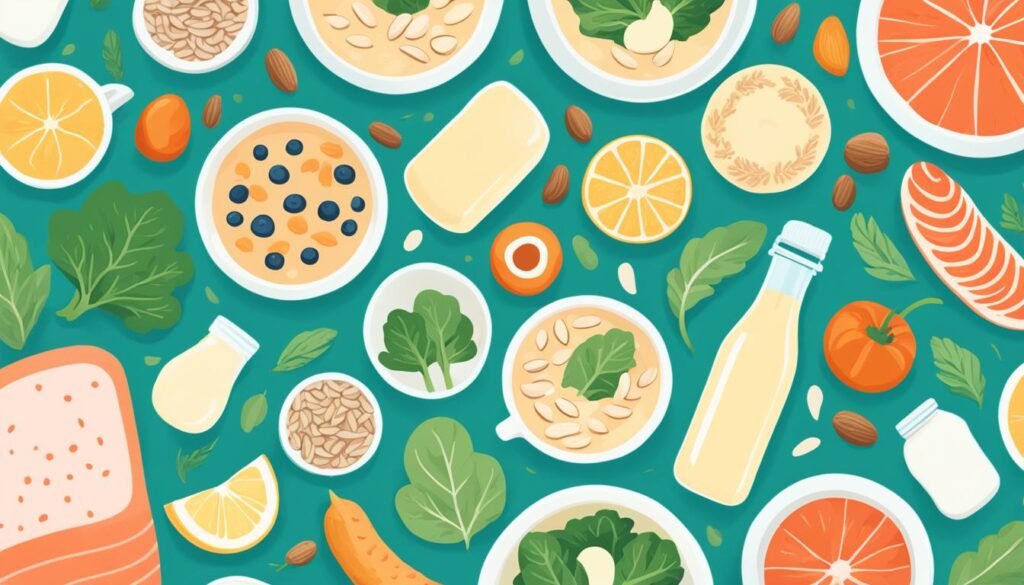Are you a breastfeeding mom seeking ways to enhance your milk production? Amidst the popular beliefs surrounding lactation and dietary choices, it’s essential to discern fact from fiction. Let’s delve into the science behind diet’s role in lactation and uncover optimal food choices for nursing moms.
Understanding Dietary Impact on Milk Supply
While specific foods’ efficacy in augmenting milk supply lacks solid scientific backing, maintaining a balanced, nutritious diet remains paramount for breastfeeding moms. Your body’s ability to produce milk and support your baby’s growth hinges on receiving adequate nutrients.
Key Takeaways:
- Specific foods’ effectiveness in boosting milk supply lacks scientific validation.
- A well-rounded diet is crucial for lactating mothers.
- Galactagogues, such as whole grains, nuts, legumes, and fenugreek, may aid milk production.
- Consult healthcare professionals for tailored advice on breastfeeding nutrition.
- Prioritize feeding your baby, and consider formula supplementation if milk supply concerns arise.
Nourishing Your Body for Lactation
Lactation operates on the principle of supply and demand, emphasizing the importance of a balanced diet alongside regular breastfeeding. Here’s how you can ensure optimal nutrition to bolster your milk supply:

Nutritional Guidelines for Breastfeeding Moms:
1. Fruits and Vegetables:
- Fill half your plate with fruits and vegetables, rich in essential vitamins, minerals, and antioxidants.
2. Whole Grains:
- Opt for whole-grain products like oats, brown rice, and quinoa to supply fiber and vital nutrients.
3. Low-Fat or Fat-Free Dairy Products:
- Choose calcium-rich options such as low-fat milk, yogurt, and cheese to foster strong bones and growth.
4. Proteins:
- Incorporate lean meats, poultry, fish, eggs, legumes, and nuts into your diet for tissue repair and cell growth.
5. Caffeine and Alcohol:
- Limit caffeine intake to prevent baby irritability and prioritize avoiding alcohol, which can impede development.
6. Hydration:
- Aim for at least 16 cups of water daily to facilitate milk production and maintain vitality.
Signs of an Adequate Milk Supply
Assessing your milk supply’s sufficiency involves observing indicators like diaper count, weight gain, feeding frequency, and audible signs of swallowing during breastfeeding. Soft, empty breasts post-feeding signify successful milk consumption.
Seek professional guidance if any concerns arise, ensuring your baby’s needs are met, and your breastfeeding journey remains rewarding.
Establishing and Sustaining Milk Supply
In the initial stages, frequent, unrestricted breastfeeding stimulates milk production. Prioritize self-care to combat stress and fatigue, fostering a conducive environment for lactation. Seeking community support can alleviate challenges and maintain motivation throughout your journey.
Leveraging Lactogenic Foods for Support
While scientific evidence is lacking, certain foods like whole grains, dark leafy greens, and galactagogues are believed to aid lactation. Experiment with incorporating these into your diet, ensuring to stay hydrated with fluids like lactation teas and water.

Tips for Pumping Moms
If pumping, align your schedule with your baby’s feeding cues, practice breast massage, and utilize visual or auditory cues for enhanced milk letdown. Additionally, consult professionals regarding herbal supplements and medication compatibility.
Monitoring and Adjusting the Milk Supply
Vigilantly monitoring your milk supply enables timely adjustments to meet your baby’s needs. Seek support from lactation consultants or postpartum doulas, prioritizing your and your baby’s well-being throughout your breastfeeding journey.
Embracing Feeding Diversity
Feeding your baby, whether through breastfeeding, formula supplementation, or a combination, fosters a profound bond. Prioritize your baby’s health by seeking professional guidance and embracing the diverse approaches to nourishment available.
Feeding your baby is a journey unique to every mother, enriched by love, care, and informed choices. Trust in your instincts, seek support when needed, and relish the beauty of nurturing your little one.
Author
-

Anne Williams is a passionate wordsmith, blending creativity with expertise in SEO to craft captivating content. With a penchant for concise yet compelling prose, she brings stories to life and leaves readers craving more. When she's not penning her next masterpiece, you can find her exploring new coffee shops or lost in the pages of a good book.
View all posts






